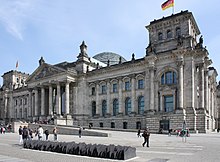Hans Adlhoch
Hans Adlhoch (born January 29, 1884 in Straubing ; † May 21, 1945 in Munich ) was a city councilor in Augsburg and a member of the Reichstag from January to March 1933 .
Life
After an apprenticeship as a carpenter and wandering around Europe, Hans Adlhoch, a member of the Christian workers' and trade union movement since 1898, trained in economics courses at the Volksverein for Catholic Germany from 1908 . From 1910 he worked as the secretary of the Catholic workers 'and workers' associations ( KAB ) in the diocese of Augsburg. After participating in the war from 1914 to 1918, Adlhoch was head of the Catholic People's Office and the workers' secretariat in Augsburg from 1919 ; in addition, he carried out extensive activities in social security and in Catholic associations.
Hans Adlhoch had joined the party's regional association, the Bavarian People's Party (BVP) , which had been separated from the center , and was a member of the Augsburg city council from 1925 to 1933. As a replacement for MP Martin Loibl , he was a member of the Reichstag from January 27, 1933 until the March election .
The committed Catholic was in " protective custody " in Augsburg from June 26 to July 5, 1933 . Arrested again for a month in 1934, Adlhoch was a prisoner in Dachau concentration camp from May to October 1935 . After that he worked again as a workers secretary in Augsburg. From 1940 Adlhoch was in military service with the technical emergency aid in Brest, France . In connection with the Hitler assassination attempt in July 1944, he was arrested again in the Operation Grid and held in the Dachau concentration camp from September 21 to April 1945, where he took part in the so-called death march at the end of April 1945 . He died shortly after the liberation in a military hospital in Munich.
Anna Adlhoch
On March 6, 1905, Hans Adlhoch married his wife Anna (née Kurz) (1876–1961) in Munich. They moved to Weilheim in 1910 and moved to Augsburg in 1919, to Peutinger Strasse 11. His wife was responsible for the workers' association there. She supported her husband and kept in touch with friends in the resistance during his detention. After the end of the war, his grave could only be found after weeks of searching in Munich's north cemetery. Hans and Anna Adlhoch adopted a daughter.
Honors
Since 1992, one of the 96 memorial plaques for members of the Reichstag murdered by the National Socialists has been commemorating Hans Adlhoch in the Tiergarten district of Berlin at the corner of Scheidemannstrasse and Platz der Republik .
On March 26, 1946, the previous Adalbertschule in Pfersee was renamed Hans-Adlhoch-Schule by resolution of the Advisory Council of the City of Augsburg , as was Adalbertstrasse in Hans-Adlhoch-Strasse.
On May 26, 2014, stumbling blocks were laid in Peutingerstraße 11 in Augsburg in memory of Hans and Anna Adlhoch.
In the Dachau concentration camp, a photo commemorates the politician and KAB secretary Hans Adlhoch, who was imprisoned in Dachau.
The Catholic Church accepted Hans Adlhoch as a martyr in the German martyrology of the 20th century .
The Hans Adlhoch Prize for solidarity in action in the world of work , donated by the Hans and Anna Adlhochstiftung e. V., confer Catholic workers 'movement, Christian workers' youth in Germany (CAJ) and company pastoral care in the diocese of Augsburg .
literature
- Bernd Haunfelder : Member of the Reichstag of the German Center Party 1871-1933. Biographical manual and historical photographs . (= Photo documents on the history of parliamentarism and political parties. Volume 4) Droste, Düsseldorf 1999, ISBN 3-7700-5223-4 , p. 292.
- Helmut Moll (ed.) On behalf of the German Bishops' Conference, witnesses for Christ. The German Martyrology of the 20th Century , 6th expanded and newly structured edition, Paderborn 2015, ISBN 978-3-506-78080-5 , pp. 72–75.
Web links
- Short biography of the German Resistance Memorial Center
- Hans Adlhoch in the online version of the Reich Chancellery Edition Files. Weimar Republic
- Website of the Hans and Anna Adlhoch Foundation in the Catholic workers' movement in Augsburg
Individual evidence
- ↑ Martin Schumacher (Ed.): MdR The Reichstag members of the Weimar Republic in the time of National Socialism. Political persecution, emigration and expatriation 1933-1945. Droste-Verlag, Düsseldorf 1991, ISBN 3-7700-5162-9 , p. 88ff.
- ↑ the section follows the description of the Hans and Anna Adlhoch Foundation, see page of the Hans and Anna Adlhoch Foundation
- ↑ Hans Adlhoch Prize at the Augsburg Chamber of Commerce , accessed on November 14, 2015
| personal data | |
|---|---|
| SURNAME | Adlhoch, Hans |
| BRIEF DESCRIPTION | German politician (Bavarian People's Party), MdR |
| DATE OF BIRTH | January 29, 1884 |
| PLACE OF BIRTH | Straubing |
| DATE OF DEATH | May 21, 1945 |
| Place of death | Munich |

